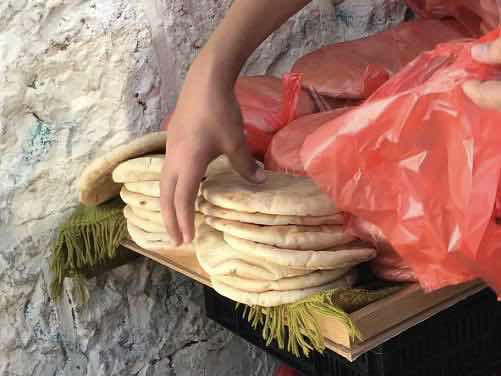I love bread. It is maybe the most favorite type of food I enjoy when I have a chance to travel. Every country, every region has a type of bread that is unique. I love the varieties of shapes, taste, texture.
Bread features significantly on this day in the life of Jesus. He has asked two of his followers to prepare the Passover meal for all of them. They will have found the room and the elements of the meal itself, including the lamb, the herbs, the wine, and the bread.
Jerusalem must have been bustling that day as many households prepared the meal. We were able to catch a glimpse of what these preparations might make looked like a few years ago. We were in Jerusalem during Ramadan in 2017. Because the Muslim population fasts during the daylight hours of these holy days, bread is prepared and sold during the afternoon for the meals after sunset. As we passed by the markets, table after table were filled with stacks of bread, prepared for the evening feast.

Bread took a significant place during Jesus’ meal with his disciples that Passover evening. During the meal, Jesus broke a piece of the bread and gave it to his disciples, telling them that the bread was like his body which would be given to them. Jesus also used a piece of the bread to indicate which disciple would betray him.
The symbol the bread took on that night has carried on throughout the history of the followers of Jesus.
Paul, one of Jesus’ later followers and leaders, wrote to the church in Corinth, “when we break the bread, aren’t we sharing in the body of Christ? And though we are many, we all eat from one loaf of bread, showing that we are one body.”
The bread came to represent not just the body of Jesus, but all of His many followers who are described as the body of Jesus.
A later writing on Christian practices takes this thought even more deeply. The Didache, written around 100 AD, describes the bread this way. “Over the broken bread say: ‘we give you thanks, Father, for the life and the knowledge which you have revealed to us through Jesus your servant. To you be glory for ever. As this broken bread scattered on the mountains was gathered and became one, so too, may your Church be gathered together from the ends of the earth into your kingdom.’”
Just as the bread we love has come from grain scattered from all over the land, we as the followers of Jesus, scattered as we are over all the earth, are brought together as one loaf, one body, the body of Jesus.
We are physically scattered today in ways that are difficult for us. But because of Jesus, the bread of life, we are one bread, the body of our Lord.